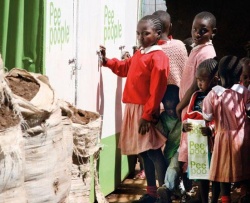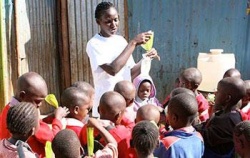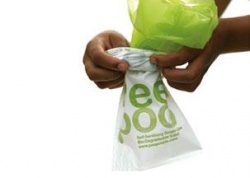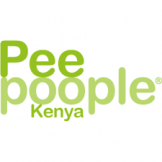Peepoo school program - Kenya
Country: Kenya
Keywords: Peepoo, biodegradable toilet, self-sanitation, fertiliser, school sanitation
Contents
Toilets don't necessarily have to be built in long-lasting masoned constructions to be effective
Basic data
The Peepoo School Programme was implemented in Kenya by the local NGO Peepoople Kenya. Peepoo toilets were implemented, which is a single-use, self-sanitising and biodegradable toilet that turns into valuable fertiliser in only four weeks time. The program included 70 informal schools and day care centres in Kibera and reached 20 000 children until 2014.
The project and the experiences:
“Before Peepoo some students would press or hold till they got home.”
Kibera in Kenya is known as Africa’s second-largest urban slum, and, as with most of the world’s urban slums, sanitation is a huge problem. Because governments find informal settlements like these undesirable, they usually don’t support or finance permanent infrastructure. In slums, there is often a lack of space for building toilets due to the high density. The available facilities are very few and often in poor condition. Many schools in urban slums completely lack toilets and those that may be available are often very dirty and overfull. Children, in particular, are afraid of falling into overfilled latrines and dislike the smell, as Camilla responsible for Peepoo School Program notes. This leaves the children with no other option than to defecate out in the open. In the worst cases, rapes have become an everyday occurrence. In an atmosphere of poor health, children are unable to fulfill their education potential. Peepoople AB is a Swedish company that produces a totally new sanitation solution called the Peepoo. The Peepoo toilet is a single-use, self-sanitising and biodegradable toilet that turns into valuable fertiliser in only four weeks time. In Kibera, the Peepoo School Program was introduced in 2012 by Peepoople Kenya which is an NGO that is responsible for the managing the implementation of Peepoo in urban slums in Kenya. The program offers more than 70 schools and kindergartens the Peepoo sanitation system along with training in hygiene, sanitation and agriculture for children, teachers, and parents. The Peepoos that are in the form of a bag contains six grams of urea and is provided in schools for free through the donor-funded Peepoo School Program. Cubicles are built in schools to provide privacy when using the Peepoo. Within the cubicle there are soak pits aimed for urination only, while Peepoos are used for defecation on a specially designed seat called Kiti. The program also provides hand washing facilities and soap.
“After using the Peepoo we make a knot, so that nothing falls out. It is really easy to use and we can simply do it ourselves. But for smaller kids who need help there is an assistant or teacher always available,” says a student. A child from another school relates to the reason why the system is popular among students: “After the implementation of the Peepoo system my toilet at school is cleaner and we are no longer sick.”
The Peepoo is not only a toilet but part of a complete sanitation system. The used Peepoos are collected and transported out of the slum on daily basis. The Peepoos are brought to a sanitation yard for the four week sanitisation period before being reused as fertiliser. Some schools keep the used Peepoos and plant vegetables using the Peepoo fertiliser which contributes to food security for the school children. “Used Peepoos can be reused as fertilizer for gardening. Therefore we store the bags for four weeks in big buckets to sanitize the content. The thereby produced output can then be reused to improve the yields of our school garden,” the teacher of a participating school says.
The Peepoo team train teachers, children and also the parents in hygiene and sanitation and agriculture as well. Peepoo Dubo is the mascot of the Peepoo School Program. All training materials use Peepoo Dubo. He also exists in full size and visits schools to remind them how to wash hands with soap. The program has been very effective and has already reached more than 10,000 children in Kibera and will now scale to 20,000 children until September 2014. The school children have also proven to be an effective channel for promoting hygiene and sanitation in the community at large through the child-to-community effect.
The Peepoo solution has now become a widely accepted technology that is flexible, easy to use, and set up very quickly and since it is so small (weighs only 10 grams) easily distributed and can be used all over the world. Peepoo toilets are also used in disaster and refugee camps, most recently in the Philippines, after a typhoon, and in Syrian camps for refugees and internally displaced people.
The key lessons of the story:
Peepoople Kenya has identified the following aspects as factors in the success of the school program:- Fast acceptance by children or toilets that are easy to use, clean and don’t smell, which makes the program easily scalable.
- Soak pits are easy to keep clean.
- Fact there are no latrines with open faeces (the faeces are enclosed in PeePoos eradicate not only the smell but also the flies.
- An attendant is important for supporting smaller children to knot the PeePoo and to make Sure children wash their hands always with soap.
Contribution to the SuSanA sustainability criteria:
Technically Appropriate, Including O&M: Peepoo fulfils WHO requirements for a safe sanitation systems since it isolates faeces from humans and other animals, and effectively sanitises the excreta before returned to nature.
Socially Acceptable and Institutionally Appropriate: a low-cost and portable system adapts sanitation to informal settlements and gains the acceptance of children.
Promote health and hygiene effectively: Peepoo dubo, the Peepoo mascot, shows a creative way to teach children about sanitation.
Socially acceptable and institutionally appropriate: Schools, students, and parents are all working together for better health in the community at large.
Project details:
Project duration: 2012-2014
Project location: Kibera, Kenya
Executing institution: Peepoople Kenya NGO
Financial support: Vi Agro forestry, Swedish Postcode Foundation
Project partners: WECF
Peepoople was formed to develop, produce and distribute the Peepoo. The mission of Peepoople is that all people who so desire shall have access to dignified and hygienic sanitation. Peepoople was founded in Stockholm, Sweden in 2006. Peepoople currently consists of Peepoople Kenya in Nairobi, Kenya. Vi Agroforestry (Vi-skogen) is a Swedish development cooperation organisation, fighting poverty and improving the environment through tree planting. We do this together with small-holder farming families and farmers’ organisations in the Lake Victoria basin in East Africa.
Swedish Postcode Foundation's vision is to contribute to a better world for people, animals and nature. The project support is distributed towards two main thematic areas: people’s living conditions and the environment. The projects contribute to poverty reduction, peace building, human rights, climate, conservation or sustainable energy.
WECF(Women in Europe for a Common Future) is a non-governmental organization established in 1994 following the 1992 Earth Summit in Rio de Janeiro, to give women a stronger voice in the field of sustainable development and environment. WECF strives for balancing the environment, health and economy, taking the different needs and perspectives of women and men into account and implements solutions locally and influences policy internationally.
For more information:
Camilla Wirseen
Peepoople
camilla.wirseen![]() peepoople.com
peepoople.com
Rahab Mbochi
Peepoople Kenya
rm![]() peepoople.co.ke
peepoople.co.ke




